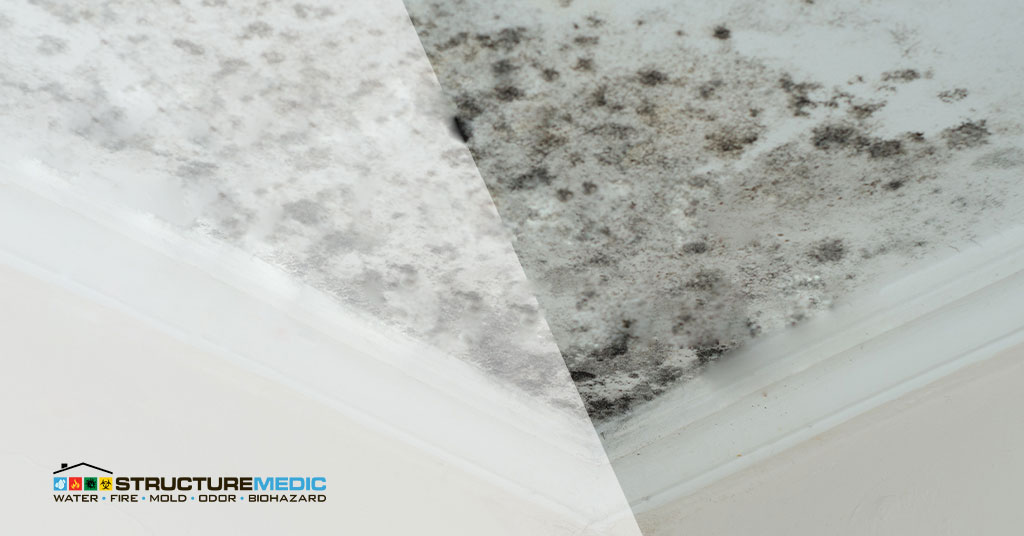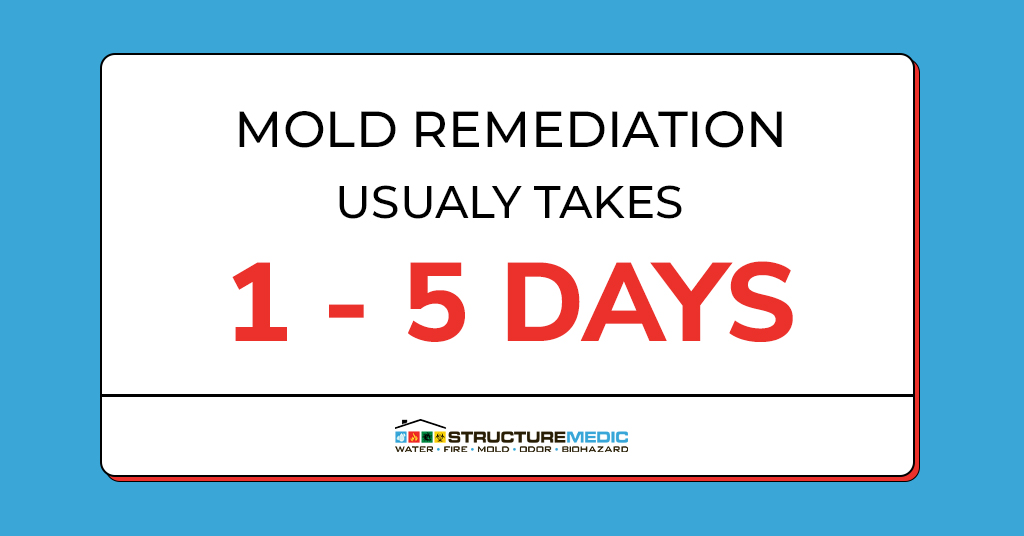
Few situations can damage a property as quickly and severely as mold. Fungus reproduces quickly, releasing spores that contribute to allergies, sick building syndrome, and respiratory distress. Some types of mold are highly toxic. Beyond the health effects, mold and mildew can eat away at upholstery, drywall, and other materials.
Mold remediation is the process of removing mold from heavily infected properties. This must be done as soon as the problem is identified, as fungus can spread widely in just 24-48 hours! There are a lot of questions regarding mold remediation that the professionals at Structure MEDIC can help answer. How long does remediation itself take? Do you need a mold inspection for your Kennesaw, GA property? When will it be ready for people to come back in? Read on to learn the basics of mold remediation.
When mold is present, it will continue reproducing as long as conditions are right. That almost always means moisture and lack of sunlight. Unfortunately, that’s not easily fixed for some parts of a property. The wall interiors, frequently damp surfaces such as bathrooms, and basements are havens for mold growth.
Mold remediation eliminates as much mold as possible and introduces measures to prevent its spread. When you disturb mold the spores break off and circulate throughout your property, so any mold removal efforts must be handled with great care.
Professional mold remediation companies will contain the affected area, then use negative pressure to prevent the spores from spreading as they remove it. Often, your property’s HVAC system will need a good cleanup as well!
First, experts will identify the main sources of the infestation and reduce mold growth factors such as moisture build-up. The mold remediation experts will then restore or replace moldy surfaces whenever possible as well as offer disinfection services to kill any lingering spores.
It’s critical to know what’s causing the mold before remediation. Otherwise, it will grow right back.
Not all mold is alike. There are hundreds of species that grow in and around buildings, some more tolerant and hazardous than others. Most prefer high humidity and moderate to cool temperatures. Very warm or very cold environments hinder mold growth, although the spores may remain dormant.
Mold can grow on various surfaces, including carpet, drywall, sheetrock, insulation, paint, wood, and ceiling tiles. Different species of mold prefer different materials to grow on. Unfortunately, their behavior varies widely. Some molds can be easily killed, while others embed themselves into materials and literally eat away at them.
The scope of your infestation and the species involved both affect how remediation will work. Oftentimes ceiling leak has allowed moisture to build up inside a wall creating an ideal environment for Chaetomium. That species can be removed by repairing the leak and clearing away the moldy patches.
However in any situation where mold has grown throughout key building structures, remediation will be needed to ensure the mold is cleared for good.. Toxic molds such as Stachybotrys chartarum, aka black mold, have serious health effects and must be handled with care.
Of course, properties can have more than one type of mold. Some are more sensitive to temperature changes or certain chemicals than others. That’s why mold remediation starts with thorough testing and evaluation. The removal team will need to evaluate what protective gear is needed, how to kill the mold, and how to minimize its spread.
All those factors can impact how long mold remediation takes.
The initial property audit, species testing, and evaluation typically don’t take more than 24 hours. The remediation process itself usually takes anywhere from 1 to 5 days. So, mild to moderate problems can often be resolved within a week.

Of course, severe infestations or situations where the mold is hard to access will extend that timeline. The first step is always to remove the conditions that are favoring mold. Sometimes that’s as simple as repairing a leak; sometimes your HVAC system will need a thorough tune-up.
Then, any infected surfaces must be cleaned or, if necessary, replaced. Drywall, wood, carpet/upholstery, and any porous surface will retain more mold. Some species, such as Trichoderma, are severely toxic yet hard to kill. If they’re embedded in the carpet or walls, the solution is usually to replace the material entirely.
Still, even serious remediation efforts can usually be completed within a few weeks. And once the process is complete, the property will be less susceptible to mold outbreaks. Mold spores will continue to float in from outdoors. But with preventative maintenance, you should be able to keep your property relatively mold-free.
Mold remediation is a simple five-step process
The good news is that this process typically doesn’t take longer than a few weeks. Unfortunately, it is a risky endeavor no matter what type of problem you have. In properties with moderate- to severe mold infestations, remediation specialists must wear special protective gear. Even non-toxic mold can cause serious health effects with high levels of exposure.
Therefore, it’s always better to bring in professionals to safely remove the mold. Mold remediation efforts require caution, strategy, and the removal of hazardous materials. To ensure that your property is both fully restored and less likely to be re-infected, leave remediation to the pros.
If you’re seeking mold remediation in Kennesaw, GA, reach out to Structure MEDIC to learn about our professional mold removal and damage restoration services.

How We Out-Perform Other Companies
We proudly serve the following cities and states:
<!–
–>
Whether you are dealing with a massive flood or a plumbing leak, we can help.
Every second counts when it comes to mitigating fire, water, and smoke damage. Our experts are here for you.
We will not only address the effects of the mold, but locate and remedy the source.
We provide thorough cleaning, decontamination, and disinfection services compassionately.
Call us after the storm. We use advanced equipment to remove water and restore your home or business.
Call us after the storm. We use advanced equipment to remove water and restore your home or business.